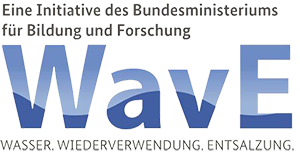Research project develops sustainable, membrane-based water desalination process
Due to the globally increasing demand for water and the decreasing availability of freshwater resources, there is a worldwide interest in efficient desalination processes. Freshwater that is influenced by the sea or by geogenic, i.e. natural, underground salt deposits often has high concentrations of sodium and chloride. High nitrate and sulphate concentrations usually result from agricultural influence. "Conventional desalination processes desalinate water completely and usually do not distinguish which salts are retained," explains Prof. Dr.-Ing. André Lerch, professor of the chair of process engineering in hydrosystems and coordinator of the innovatION joint project. "However, a complete desalination of the waters is often not useful, but only a reduction of the monovalent, singly charged ions."
The aim of the innovatION research project is to develop an energy-efficient selective membrane-based desalination process for the targeted removal of monovalent ions from saline groundwater and surface water, and to examine potential applications and areas of use, taking into account water chemistry, economic and ecological aspects.
innovatION stands for Selective Removal of Monovalent Ions from Saline Waters for Groundwater Recharge and Drinking Water Treatment. The joint project will be funded over the next three years by the Federal Ministry of Education and Research BMBF within the funding measure "Water Technologies: Water Reuse". innovatION brings together nine national partners from practice and science as well as two international associated partners.
Within the framework of innovatION, selective membranes for specific retention of monovalent salts are being developed and installed in newly designed modules for use in an electrochemical process in laboratory and pilot plants. The plants will be used to carry out investigations to identify optimised process and plant parameters depending on different raw water qualities and treatment targets. The resulting effects and challenges for the different raw waters will be examined. The developed technology will be compared with international targets such as the sustainability goals using a holistic economic-ecological sustainability assessment in order to derive recommendations for action.
By choosing partners from industry, science and practice, the consortium is able to build plants and test and evaluate the innovative technology on site with practical partners. Young scientists can be involved in cooperation and exchange with international scientists at an early stage. The results thus contribute significantly to securing water resources and further education, both nationally and internationally.
Press release on the "innovatION" research project
article_from
contact_person_press:
- tud
- Prof. Dr.-Ing. André Lerch
- professorship
- telephone_short: +49 351 463-37537
- email_short: andre.lerch@tu-dresden.de
contact_person_generally:
- tud
- M.Sc. Hanna Rosentreter
- professorship
- telephone_short: +49 351 463-37872
- email_short: hanna.rosentreter@tu-dresden.de



